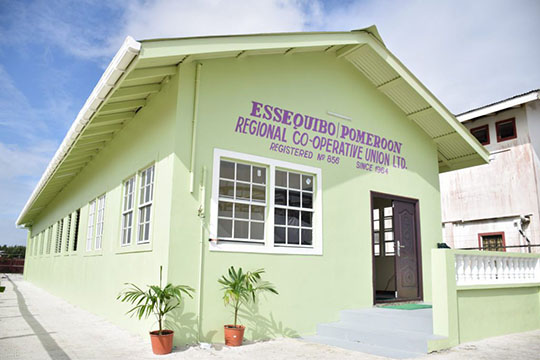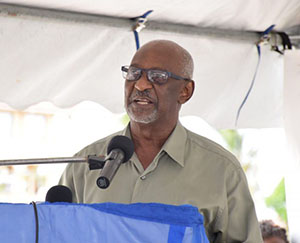Between 1989 and 2016 the number of cooperative societies in Guyana slumped from 1440 to 1268, a decline of 20% according to a 2017 report from a Ministerial Task Force set up to address “the Revitalization of the Cooperative Movement in Guyana.”
And according to the Report, sustained infusion of large amounts of state funds into the cooperative movement over the years had resulted in “inadequate capital formation”, which had the effect of creating a dependency syndrome and ran counter to the spirit of co-operativism.
The Report addresses a range of oft-repeated criticisms of the cooperative movement in Guyana including what it says were major management problems resulting from “a dearth of good managers.” That deficiency, it contended, led to “some degree of mismanagement of resources owned by cooperatives.” This, it said, contributed to a “decline in production/output and eventually in the number of functioning cooperatives.” The Report adds that the provision of “annual subsidies” by government had had the effect of discouraging members of the “apex and district unions from paying their dues.”

The biggest numerical decline in the number of cooperatives over the period occurred in Region Five where 49 of the 136 cooperatives that were active in 1989 ‘went under’ during the period under review. The largest decline by percentage terms occurred in Region One where cooperatives declined by 56%, the actual number of Societies in the Region having shrunk from 75 to 33. Overall, a total of 172 cooperatives ceased to function between 1989 and 2016.
Further, the Report states that even of the 1268 cooperative societies listed as functioning in 2016 many were “not active.”
And the Report of the Ministerial Task Force points directly to the role of the state in imposing what it said were “political decisions,” which, though well-intended……….weighed heavily against the effective operation of societies. “In many cases, societies were hurriedly registered before a proper viability study was done.” The report adds that while cooperatives, by nature should be promoted on the basis of felt or induced need “many persons were drawn into these societies because it was the state’s wish for this type of economic activity as the basis for developing the small man. Formal investment of the small man in this sector was considered the panacea of achieving real economic growth,” it says.
The cooperative movement in its heyday owned and controlled vast amounts of resources including real estate and cash, according to the Report. While it alludes to “large deposits of cooperative-owned finances in the Guyana National Cooperative Bank, the National Industrial and Commercial Investments Ltd and other financial institutions it provides no information regarding the fate of “real estate” which it says had previously been “owned and controlled by the cooperative movement.”
Meanwhile, even as the report alludes to the negative effects of government control on the fortunes of the cooperative movement, what is being seen as a concerted attempt at resuscitation is proceeding with major financial and administrative support from the political administration. With the advent of the present coalition administration in 2015 government created administrative space for cooperatives within the Ministry of Social Protection.
A year ago, government announced that as part of its Rural Agricultural Infrastructure Development (RAID) project, being financed by the Caribbean Development Fund (CDF) it was initiating a US$12 million rollout of four new cooperative unions at Buxton, Beterverwagting-Triumph, Ithaca and at Mocha-Arcadia, ostensibly to address unemployment issues in “neglected” communities.
Recently, Minister responsible for Cooperatives Keith Scott announced that government had begun resuscitating cooperatives in Regions Two, Three, Four, Five, Six and Ten with the state-run Guyana National Co-operative Union Limited. (GNCUL) providing oversight.
Noting that over the past two decades “the cooperative movement had contracted” both in operational and ideological terms.” the Report says that many societies “are not functioning in accordance with the law under which they were established.”
An assessment of Cooperative Societies undertaken as part of the report reveals that of the 198 Societies contacted only 15 of these were considered “safe,” insofar as they were “active,” their Annual Reports were no more than 2 years overdue, good internal controls, active bank accounts and up-to-date members’ registers were in place. To qualify as “safe” cooperatives would also have had to have been holding regular meetings within the last two years. At the other extreme the inquiry found that 150 or 76% were “irretrievable” insofar as they had not submitted annual reports in more than eight years, and possess no adequate records. Additionally, neither management nor interested members of these “irretrievable societies” can be found, and bank accounts are dormant.” These ‘societies’ have also been classified as having “no chance of becoming a going concern” and need to be dissolved.
The Societies assessed in the Report are registered as Thrift/Savings, Land/Housing, Farming, Dairy, Credit Union, Cattle/Poultry, Consumers’, Multipurpose and Others.
According to the Report if the cooperative movement is to be positioned as a major player in job creation and stimulating economic growth the “immediate actions” intended to mobilize critical requirements for “productive ventures” include the re-introduction of School Thrift Societies in Primary Schools and the introduction of School Thrift Societies in Secondary Schools, the staffing of the Cooperatives Department with approved positions, an assessment/audit of tertiary societies and the securing of technical assistance from technical partners such as the International Labour Organization (ILO) to enable capacity-building.






